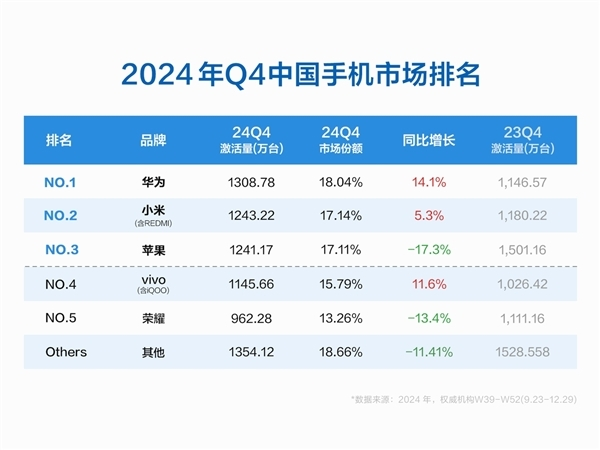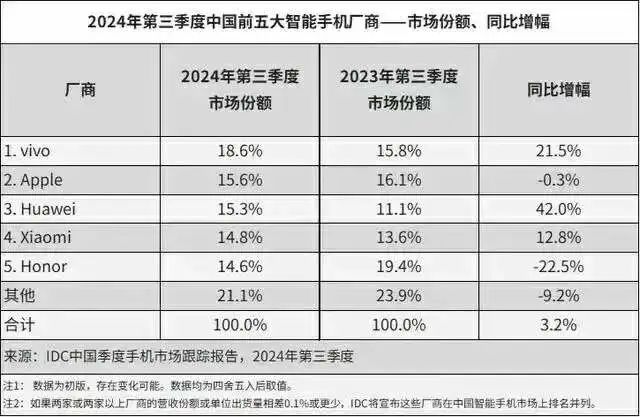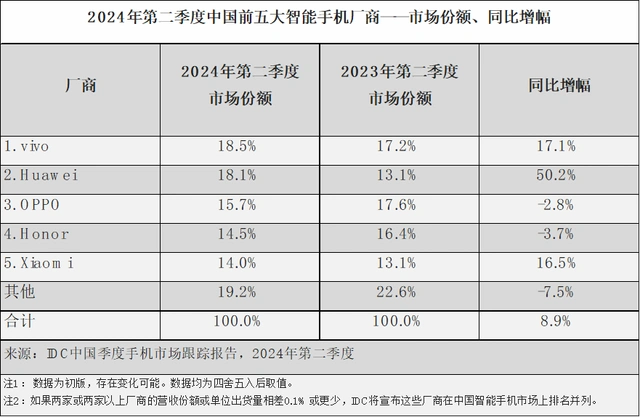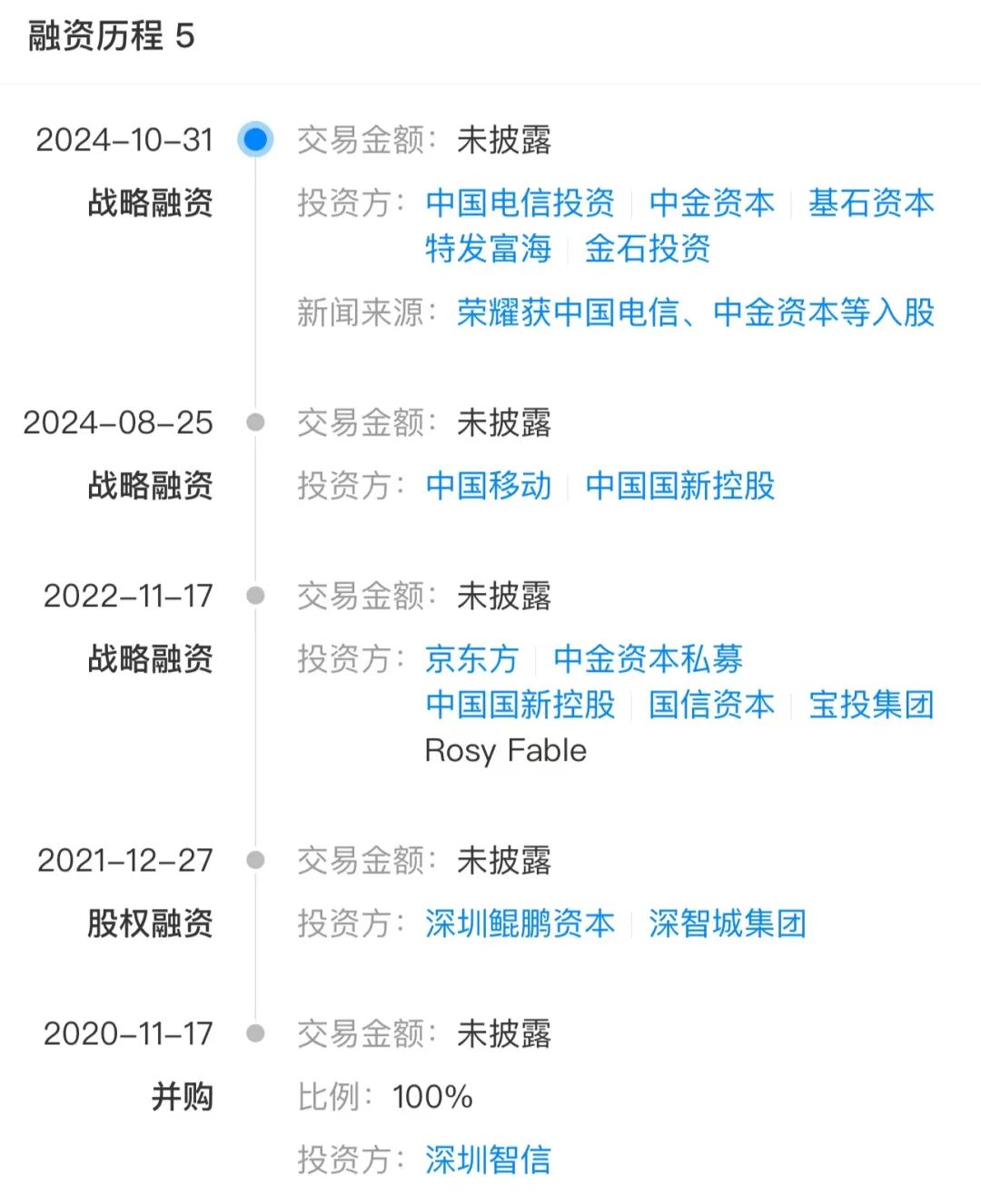The IPO Glow Fades: From Market Leader to Follower
![]() 01/20 2025
01/20 2025
![]() 473
473
Source | Deep Blue Finance
Written by | Wu Ruixin
Recent rumors surrounding the departure of Glory CEO Zhao Ming and his entire team have garnered considerable public attention. Additionally, a mobile phone ranking list for Q4 2024 has placed Glory in an awkward position.

The list indicates that the activation volume of Glory's new phones has decreased by 13.4% year-on-year, with its market share dipping to 13.26%. This decline has seen Glory drop from first place in the first quarter to fifth.
In fact, since the second quarter of 2024, Glory's sales performance in China has suddenly cooled. The further decline in the fourth quarter suggests that Glory has been unable to reverse the trend.
This comes as a shock to both Glory and its investors, occurring at a crucial juncture when the company is pushing forward its IPO, having just completed its shareholding reform and awaiting the formal submission of its listing application.
Theoretically, phone manufacturers have ample cash flow and do not necessarily need to raise funds through an IPO. To date, four out of the five major domestic phone manufacturers have not gone public. This raises the question: why is Glory in such a rush to become the second phone manufacturer to go public?
1. From First to Fifth: Sales Continue to Decline
As we enter 2025, the ranking of Chinese mobile phones for Q4 2024 has been recently announced. Surprisingly, Glory stands out as the domestic smartphone brand with the largest year-on-year decline in activation volume in Q4, excluding Apple.
According to the Q4 2024 China mobile phone market ranking released by the authoritative institution IDC, Huawei phones have regained the top spot in the Chinese market with a market share of 18.04%. In contrast, the activation volume of new Glory phones was 9.6228 million units, with a market share of 13.26%, a year-on-year decline of 13.4% compared to 2023.
In today's fiercely competitive smartphone market, Glory's ranking has slipped to fifth.

Notably, according to data from IDC, in the first quarter of 2024, Glory ranked first among China's top five smartphone manufacturers with a market share of 17.1%, and its shipments increased by 13.2% year-on-year.
However, in the second quarter, Glory's market share fell to 14.5%, and its ranking dropped from first to fourth. Shipments also declined by 3.7% year-on-year.
The sales decline continued in the third quarter. According to IDC data, in Q3 2024, Glory's market share was 14.6%, and its shipments declined by 22.5%. Its ranking further dropped to fifth.

In other words, Glory's market share decline did not start in the fourth quarter but began in Q2 2024, when its sales growth trend abruptly halted and even gradually declined.

Throughout last year, the rankings of various phone manufacturers fluctuated, with each taking turns to occupy the top spot, making the competition fierce.
Amidst this intense competition, besides Glory, OPPO's decline was also particularly notable. OPPO was even categorized as "others" by some institutions, not worthy of being mentioned individually.
However, compared to OPPO, Glory may be more anxious, given its active pursuit of the IPO process.
2. Bound by Distributors and Pushed to Go Public: Valuation Discounted
It seems that Glory's IPO was destined from the moment of its independence.
Generally, the purpose of a company going public is, to some extent, to seek financing. Among the five major domestic phone manufacturers, so far, only Xiaomi has gone public. The reason they do not choose to go public is mainly because they simply do not lack funds.
The same is true for Glory.
At the beginning of 2024, Glory CEO Zhao Ming revealed that Glory's net profit realization rate at that time was as high as 120%-130%, with tens of billions of cash flow on its books. Although it is still far from Xiaomi's cash flow of over 150 billion yuan in terms of scale, these tens of billions are sufficient to support Glory's future strategic expansion given its current single business.
So, why is Glory actively promoting its IPO despite not lacking funds? Behind this, it may be related to the eagerness of Glory's shareholders to realize value.
As everyone knows, Glory was once a sub-brand of Huawei. In 2020, when Huawei was hit by US sanctions, Glory had to develop independently.
At the end of 2020, Huawei announced the overall sale of Glory and completely withdrew from the shareholder level, not participating in operation management and decision-making. The buyer of Glory was Shenzhen Smart City Technology Development Group, a state-owned enterprise in Shenzhen, which jointly established a new company with more than 30 Glory agents and distributors.
This turned a large number of former Huawei distributors into shareholders of Glory, deeply binding their interests.
For example, mobile phone distribution giants Tianyin Holding and Aishide respectively invested 500 million and 660 million yuan in the acquisition of Glory.
With a deep tie-up with distributors, just one year after its independence, Glory had over 30,000 offline stores and counters, with offline sales accounting for more than 70% of its total sales. This helped Glory's products quickly gain a foothold in the market in the early stages of its independence.
In addition to early agents and distributors, Glory also introduced supply chain partners.
In November 2022, Glory received a strategic investment of 1 billion yuan from BOE, a panel supplier.
In August 2024, Glory received investment from China Mobile.
According to Tianyancha, after the completion of shareholding reform, Glory's shareholders have covered multiple levels, including local state-owned assets, third-party capital, supply chains, distributors, mobile operators, etc., tying together partners from upstream and downstream of the mobile phone industry chain.

Screenshot from: Tianyancha
Going public has also become the common expectation of shareholders, distributors, and supply chain partners.
In November 2023, Wu Hui, with a background in Shenzhen's state-owned assets, replaced Wan Biao as the chairman of Glory after the latter resigned for personal reasons following the initiation of shareholding reform. It is reported that one of Wu Hui's primary tasks upon joining was to promote the IPO, which may represent the wishes of major shareholders.
Furthermore, employees were also a driving force behind Glory's IPO. Similar to Huawei, Glory internally had a so-called "Striver Agreement," where employees gave up annual leave and year-end bonuses in exchange for equity dividends after the IPO. With the completion of shareholding reform, this agreement seems to be changing recently, reflecting employees' anticipation of Glory's IPO as well.
However, with Huawei's return, Glory's valuation has also changed.
According to a previous report by Caixin, a channel merchant revealed that the price at which Shenzhen's state-owned assets acquired Glory from Huawei may have been as high as approximately 260 billion yuan. According to a pre-IPO financing plan for Glory, the company plans to submit materials for listing on the ChiNext board in 2024, with a pre-IPO valuation set at 200 billion yuan.
This means that Glory's current valuation has shrunk by 23% compared to when it officially became independent from Huawei.
3. Overseas Expansion and AI Become the Hope for "the Village"
It can be said that Glory's biggest rival right now is still Huawei.
Since its independence, the "shadow of Huawei" has always accompanied Glory. According to media reports at the time, although Glory did not emphasize the "Huawei" label in official channel training, when consumers went shopping offline, sales staff would still directly or indirectly tell them, "Glory is just a Huawei phone that supports 5G."
In the early stages of Glory's independence, products including the Magic3, Honor 50, and 70 series still bore a clear "Huawei series" design. Internally, most functions of Glory phones, such as Huawei Reading and Huawei Video, were also provided by Huawei.
The shadow of Huawei allowed Glory to inherit Huawei's market share to a certain extent in its early stages. In just a few years, it quickly captured market share, achieving the top market share for multiple quarters.
However, in September 2023, Huawei made a high-profile return, dealing a huge blow to Glory in the high-end market. With a high overlap in dealer channels between Glory and Huawei, as Huawei made a strong comeback, its new products were snapped up. Although dealers were deeply tied to Glory, it was difficult for them to please both sides, and as a result, Glory's sales inevitably suffered.
At the same time, Glory also decided to completely sever ties with Huawei. In November 2023, Zhao Ming announced at the launch of the Glory 100 series that starting with the Glory 100 phone, all applications such as Glory's cloud services, wallet, video, music, reading, and game center would be upgraded and switched, cutting ties with Huawei's services, and the user accounts of the two would no longer be interconnected.
A complete separation is bound to come with a "painful period."
Since then, Glory's smartphone market share has been on a downward trend. After the third quarter of 2023, Huawei's market share in the domestic market quickly increased from 13% to 18.04% in the following quarter. Meanwhile, Glory's market share fell from 19.3% in the same period to 13.26%.
Nevertheless, Glory's new products that have shed the shadow of Huawei have also received positive market feedback. For example, according to data disclosed by Glory, as of October 2024, shipments of the Honor X50 had reached 15 million units.
To achieve a higher market value in its IPO, telling a compelling story is crucial. Currently, besides the "Huawei concept stock" label that Glory can never shake off, the only story that can impress the capital market is probably overseas expansion and AI.
However, currently, domestic phone manufacturers are all striving to develop overseas markets and AI phones.
In terms of overseas expansion, in December 2024, the proportion of Glory's overseas sales exceeded 50%. However, in terms of global market share, Glory is still classified as "others."

Regarding AI, although at the launch of the Glory Magic7 series, Zhao Ming demonstrated the scenario of using the "YOYO" intelligent agent to order 2,000 cups of coffee, which amazed many people, from the sales volume in the fourth quarter, it seems that Glory's AI has not been reflected in market performance.
How to tell a satisfying story, Glory may still need to continue thinking about it.








